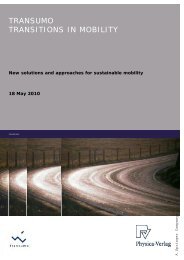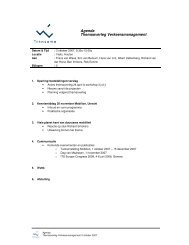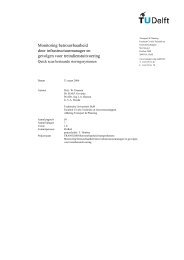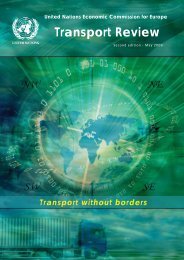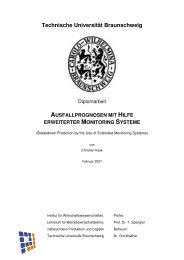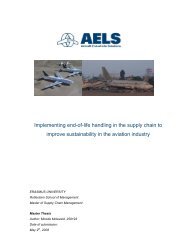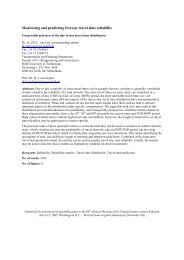Eindrapportage Ruimte voor Geo-Informatie RGI - Transumo Footprint
Eindrapportage Ruimte voor Geo-Informatie RGI - Transumo Footprint
Eindrapportage Ruimte voor Geo-Informatie RGI - Transumo Footprint
You also want an ePaper? Increase the reach of your titles
YUMPU automatically turns print PDFs into web optimized ePapers that Google loves.
BIJLAGE 13<br />
Advies van de Adviesraad Gebruikers<br />
Program assessment Users Advisory Council <strong>RGI</strong><br />
Innovation<br />
System innovation:<br />
Distinction must be made between scientific-technical innovation and innovation of the system in the domain<br />
of communication in society by improving the knowledge flows between science,education, professional<br />
practice and society. The projects in the programme Knowledge themes; Public order & Safety (OOV), Spatial<br />
Planning & Design (ROI), Consumers & Students (COL), National <strong>Geo</strong>/Information Infrastructure (NGII)<br />
have resulted in the following:<br />
• A strong knowledge network between the research institutes, public organisations and geo-business<br />
in the Netherlands<br />
• Integration of Bèta and Gamma sciences on the geo-information domain<br />
• Political support to establish a national geo-information infrastructure and outlined in GIDEON policy<br />
document approved by the Dutch government in 2008.<br />
From this point of view it is innovative for the Netherlands and even world wide. Only a few countries made<br />
comparable efforts for raising awareness about geo-information.<br />
Market innovation<br />
The excellent social relevance and the potential economic relevance of this theme are reflected in a high<br />
level of innovative activities by the Dutch geo industry. The technological development on the different components<br />
of the geo-information system (GIS) were mainly made with proven techniques or required only limited<br />
new green field developments. However frontier developments have been made by the integrated approach<br />
and usage of the different components in new domains as outlined in the knowledge themes of the<br />
programme. In particular the development of coupled modelling linked to GIS, dynamic numerical models<br />
presenting there results and spatial impact scenario’s in geo-information systems in a standardised method<br />
using the NGII. Currently already 7 projects have created added market value and are regarded as commercial<br />
success by the geo-business community. The potential commercial spin-off within the coming 2-3 years<br />
after the formal end of the programme is estimated to become much higher because a large amount of projects<br />
is rated revolutionary. During the programme the result of these were implemented by the early adaptors<br />
however currently a main stream implemented has not yet materialized. This is regarded by the members<br />
of the council just a matter of time.<br />
Valorisation<br />
Scientific Quality: The council agrees with the point of view that this theme, regarding its nature of an applied<br />
research programme, would only aspire to limited scientific aims and therefore can’t really be measured by<br />
this key. Nevertheless the presented projects demonstrate some successful scientific results (peer reviewed<br />
articles and ongoing PhD research). Part of this scientific output is situated in communication and pedagogic<br />
sciences rather than in sec the field of geo-information science and geomatics.<br />
Economic Relevance (value for money):The present involvement of private companies makes the projects<br />
moderately relevant from a point of view of direct benefits. However potential commercial spin-off is regarded<br />
high.<br />
Societal relevance:: The very high societal relevance has the potential to become a strong driving force behind<br />
the creation of new national and international business in the future for the Dutch geo information industry.<br />
However, big ICT-companies like Microsoft, Google and Tomtom, have as business strategy fast implementation<br />
of technical geo-spatial innovations in their consumer products and services in order maintain their<br />
competitive edge. Hence they invest more in proprietary research, early adoption and added value geo-<br />
36



